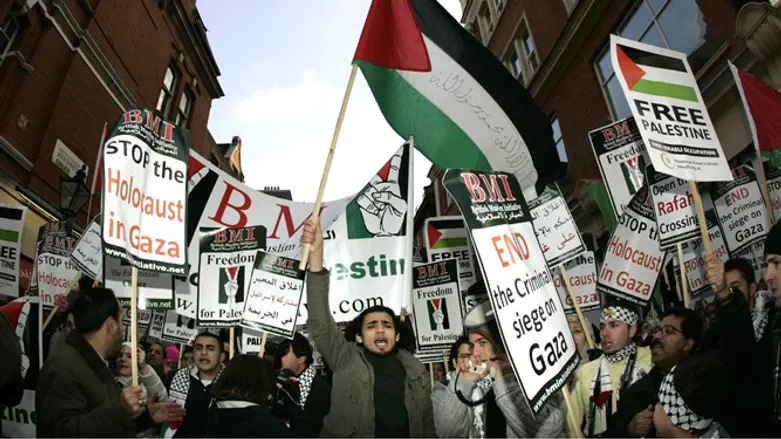
As the centennial of the Balfour Declaration approaches, British officials continue to exhibit zero tolerance for the intensifying campaign of anti-Israel Arab forces against the Declaration, the "crime" that led to "the sowing of a Zionist entity that steals and invades," as those forces put it.
The November 2, 1917, Balfour Declaration was sent by then-British Foreign Secretary Arthur Balfour to Lord Walter Rothschild, a leader of Britain's Jewish community, and proclaimed Britain’s support for the establishment of a Jewish national home in British-Mandate Palestine, saying in part:
"His Majesty's government view with favour the establishment in Palestine of a national home for the Jewish people, and will use their best endeavours to facilitate the achievement of this object, it being clearly understood that nothing shall be done which may prejudice the civil and religious rights of existing non-Jewish communities in Palestine, or the rights and political status enjoyed by Jews in any other country."
That independent homeland was contingent on a Jewish majority, which was the case within the borders set when the state was established.
In recent months, the PLO has headed a campaign in an attempt to force Great Britain to apologize for the Balfour Declaration. The organization has gone so far as to threaten to sue Britain over the document.
The British government in April rejected the demand to apologize for the Declaration, saying, “The Balfour Declaration is an historic statement for which HMG (Her Majesty’s Government) does not intend to apologize. We are proud of our role in creating the State of Israel. The task now is to encourage moves towards peace.”
The Guardian reported that, in the latest efforts against the Declaration, PA representatives in London sought to hang a series of “before and after” posters in the London underground and on buses juxtaposing the presumed idyllic life of Palestinian Arabs before the establishment of the State of Israel in 1948 with a false picture of their allegedly low quality of life afterward.
The posters also cite a phrase from the Balfour Declaration, whereby “nothing shall be done which may prejudice the civil and religious rights of existing non-Jewish communities in Palestine,” as if it is not t he case, although Israeli Arabs have complete civil and religious rights, and are employed in every capacity from MKs to the Supreme Court. As far as Arabs who are not Israeli citizens are concerned, 96% of the Arabs in Judea and Samaria are governed by the Palestinian Authority.
However, the London municipality’s transportation branch (TfL) rejected the campaign, stating that it “did not comply fully with our guidelines,” which ban “images or messages which relate to matters of public controversy or sensitivity” and are “party political.”
While TfL will often allow advertisers to amend questionable aspects of their campaigns, in this case the campaign was rejected without such consultation.
In response to the decision, the PA ambassador to the UK Manuel Hassassian said on Tuesday that “Palestinian history” was being “censored.”
“Palestinian history is a censored history. There has been a 100-year-long cover-up of the British government’s broken promise, in the Balfour declaration, to safeguard the rights of the Palestinians when it gave away their country to another people. TfL’s decision is not surprising as it is, at best, susceptible to or, at worst, complicit with, all the institutional forces and active lobby groups which continuously work to silence the Palestinian narrative. There may be free speech in Britain on every issue under the sun but not on Palestine.”
According to The Guardian, TfL and the British Foreign Office denied they had discussed the advertising campaign, and the mayor of London, Sadiq Khan, was not involved in the decision.